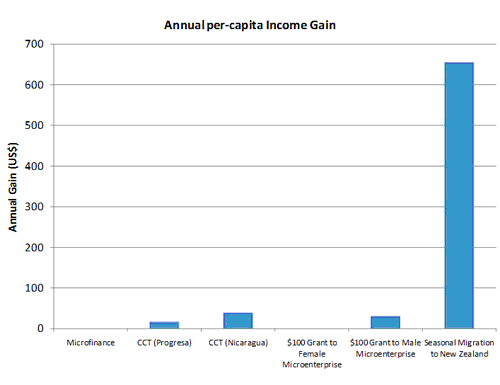The secret to fighting poverty is New Zealand
In a new World Bank blog post (h/t @poverty_action), economist David McKenzie explains why he thinks facilitating international migration should be at the top of everyone’s list of effective development interventions. Compared to microfinance, conditional cash transfer programs and cash grants to microentrepreneurs, a seasonal migration program in New Zealand produced WAY larger gains in annual income for program beneficiaries.

The good news doesn’t stop there. The usual fears for or about migrants—that they would be vulnerable to poor treatment, or that they would take advantage of the program to over stay their visas—don’t seem have materialized:
In addition to estimating per-capita income gains of 30-40%, we find that participating in the RSE leads to greater subjective well-being, more durable asset purchases, housing improvements, and in Tonga, a large increase in secondary schooling. Moreover, as a recent evaluation by New Zealand’s labor department found, these gains came with minimal displacement of native workers, and overstay rates of less than 1%.
Previously on this blog, Michael Clemens wrote that the development program known as leaving Haiti has pulled far more Haitians out of poverty than anything else that has ever been tried.
 From Aid to Equality
From Aid to Equality
